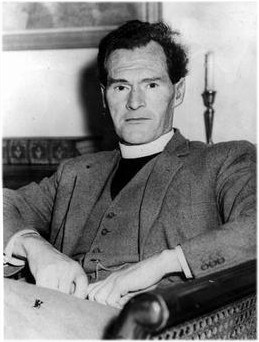Week Six : introduction
|
|
R.S. Thomas March 29th, 2013 is the hundredth anniversary of the birth of Welsh priest and poet Ronald Stuart Thomas. Raised in Holyhead, Anglesey, he graduated in classics at the University of Wales, completed theological training at St Michael's College, Llandaff. Thomas became from 1936 a priest in the Church in Wales in several parishes that became associated with his poetry. He was an outspoken Welsh nationalist. Thomas's first collection, The Stones of the Field, published in 1946, was followed by more than 50 other books of poetry and prose. He retired from active ministry in 1978 and died in 2000. Thomas won numerous prestigious awards for his poetry and was nominated for the 1996 Nobel Prize for Literature. This selection is from his later poetry, considered by many as amongst the finest religious poetry of the twentieth century. It's a profound and anguished search for an elusive God in our contemporary world of globalized consumerism and technology. Some of it is not an easy read, but it's worth the effort. Each picture is chosen for a connection with Thomas's poem. The musical work for the entire week is W.A. Mozart's Great Mass in C minor (K.427), performed by the Bavarian Radio Choir and Orchestra, conducted by Leonard Bernstein, with Arleen Auger and Frederica von Stade (Sopranos), Frank Lopardo (Tenor) and Cornelius Hauptmann (Bass). We still do not know why Mozart composed his C minor Mass. If it had been completed, it would have been twice his normal length for a mass. Nor do we know why the Mass was unfinished. The mass was not finished by Mozart, nor was it performed in his lifetime. Yet, the eleven parts he completed are among the finest of his sacred works. The completed parts are: Gloria Gloria in excelsis Deo (Allegro vivace: Chorus) Laudamus te (Allegro aperto: Soprano II) Gratias agimus tibi (Adagio: Chorus) Domine Deus (Allegro moderato: Sopranos I and II) Qui tollis (Largo: Double choir) Quoniam tu solus (Allegro: Sopranos I and II, Tenor) Jesu Christe (Adagio: Chorus) – Cum Sancto Spiritu (Chorus) Credo Credo in unum Deum (Allegro maestoso: Chorus) Et incarnatus est (Andante: Soprano I) Sanctus (Largo: Double choir) and Benedictus (Allegro comodo: Quartet and Double chorus) |
